
Imperialism is a policy or ideology of extending the rule over peoples and other countries, for extending political and economic access, power and control, often through employing hard power, especially military force, but also soft power. While related to the concepts of colonialism and empire, imperialism is a distinct concept that can apply to other forms of expansion and many forms of government.
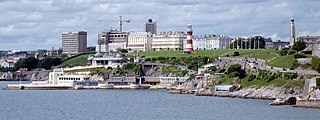
Plymouth Hoe, referred to locally as the Hoe, is a large south-facing open public space in the English coastal city of Plymouth. The Hoe is adjacent to and above the low limestone cliffs that form the seafront and it commands views of Plymouth Sound, Drake's Island, and across the Hamoaze to Mount Edgcumbe in Cornwall. The name derives from the Anglo-Saxon word hoh, a sloping ridge shaped like an inverted foot and heel.

The Second Boer War, also known as the Boer War, the Anglo-Boer War, or the South African War, was fought between the British Empire and two independent Boer states, the South African Republic and the Orange Free State, over the Empire's influence in South Africa. The trigger of the war was the discovery of diamonds and gold in the Boer states. Initial Boer attacks were successful, and although British reinforcements later reversed these, the war continued for years with Boer guerrilla warfare, until harsh British counter-measures including a scorched earth policy brought the Boers to terms.
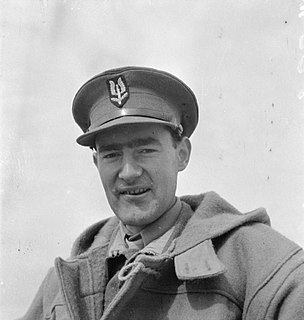
Lieutenant Colonel Sir Archibald David Stirling, was a Scottish officer in the British Army, mountaineer, and the founder of the Special Air Service. He saw active service during the Second World War.

The Afrika Korps or German Africa Corps was the German expeditionary force in Africa during the North African Campaign of World War II. First sent as a holding force to shore up the Italian defense of its African colonies, the formation fought on in Africa, under various appellations, from March 1941 until its surrender in May 1943. The unit's best known commander was Field Marshal Erwin Rommel.

The King's African Rifles (KAR) was a multi-battalion British colonial regiment raised from Britain's various possessions in East Africa from 1902 until independence in the 1960s. It performed both military and internal security functions within the colonial territories, and served outside these territories during the World Wars. The rank and file (askaris) were drawn from native inhabitants, while most of the officers were seconded from the British Army. When the KAR was first raised there were some Sudanese officers in the battalions raised in Uganda, and native officers were commissioned towards the end of British colonial rule.

The Distinguished Conduct Medal, post-nominal letters DCM, was established in 1854 by Queen Victoria as a decoration for gallantry in the field by other ranks of the British Army. It is the oldest British award for gallantry and was a second level military decoration, ranking below the Victoria Cross, until its discontinuation in 1993 when it was replaced by the Conspicuous Gallantry Cross. The medal was also awarded to non-commissioned military personnel of other Commonwealth Dominions and Colonies.

The North African campaign of the Second World War took place in North Africa from 10 June 1940 to 13 May 1943. It included campaigns fought in the Libyan and Egyptian deserts and in Morocco and Algeria, as well as Tunisia.
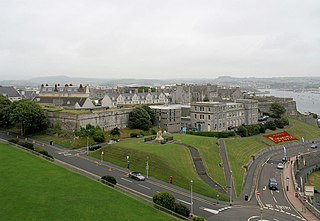
The Royal Citadel in Plymouth, Devon, England, was built in the late 1660s to the design of Sir Bernard de Gomme. It is at the eastern end of Plymouth Hoe overlooking Plymouth Sound, and encompasses the site of the earlier fort that had been built in the time of Sir Francis Drake.
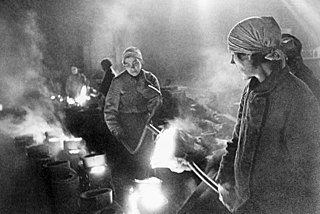
Military production during World War II was the arms, ammunition, personnel and financing which were produced or mobilized by the belligerents of the war from the occupation of Austria in early 1938 to the surrender and occupation of Japan in late 1945.
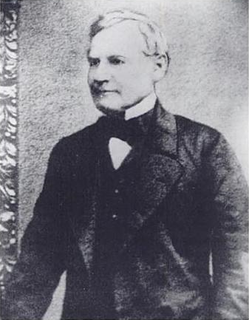
Admiral Sir Charles Elliot was a British Royal Navy officer, diplomat, and colonial administrator. He became the first Administrator of Hong Kong in 1841 while serving as both Plenipotentiary and Chief Superintendent of British Trade in China. He was a key founder in the establishment of Hong Kong as a British colony.
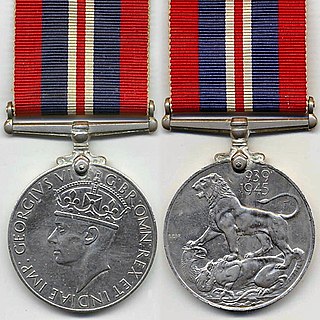
The War Medal 1939–1945 is a campaign medal which was instituted by the United Kingdom on 16 August 1945, for award to citizens of the British Commonwealth who had served full-time in the Armed Forces or the Merchant Navy for at least 28 days between 3 September 1939 and 2 September 1945.
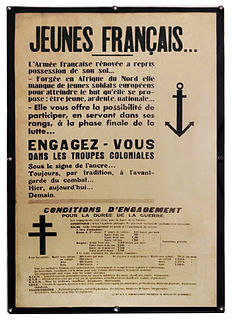
Colonial troops or colonial army refers to various military units recruited from, or used as garrison troops in, colonial territories.

The British War Medal is a campaign medal of the United Kingdom which was awarded to officers and men of British and Imperial forces for service in the First World War. Two versions of the medal were produced. About 6.5 million were struck in silver and 110,000 in bronze, the latter awarded to, among others, the Chinese, Maltese and Indian Labour Corps.
The military history of South Africa chronicles a vast time period and complex events from the dawn of history until the present time. It covers civil wars and wars of aggression and of self-defence both within South Africa and against it. It includes the history of battles fought in the territories of modern South Africa in neighbouring territories, in both world wars and in modern international conflicts.
The military history of Africa is one of the oldest military histories in the world. Africa is a continent of many regions with diverse populations speaking hundreds of different languages and practicing an array of cultures and religions. These differences have also been the source of much conflict since a millennia.

The Ethiopian Empire, also formerly known by the exonym Abyssinia, or just simply known as Ethiopia, was a monarchy that spanned a geographical area in the current states of Ethiopia and Eritrea. It began with the establishment of the Solomonic dynasty by Yekuno Amlak from approximately 1270 and lasted until 1974, when Emperor Haile Selassie was overthrown in a coup d'état by the communist Derg. It was throughout much of its existence surrounded by hostile forces in the African Horn however it managed to preserve and develop its ancient form of Christianity based kingdom.

In the American Revolution, gaining freedom was the strongest motive for Black enslaved people who joined the Patriot or British armies. It is estimated that 20,000 African Americans joined the British cause, which promised freedom to enslaved people, as Black Loyalists. Around 9,000 African Americans became Black Patriots.
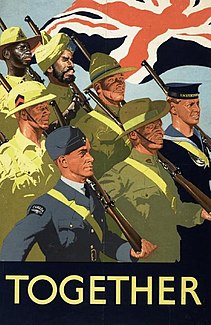
When the United Kingdom declared war on Nazi Germany in September 1939 at the start of World War II, the UK controlled to varying degrees numerous crown colonies, protectorates and the Indian Empire. It also maintained unique political ties to four of the five independent Dominions—Australia, Canada, South Africa, and New Zealand—as co-members of the then "British Commonwealth". In 1939 the British Empire and the Commonwealth together comprised a global power, with direct or de facto political and economic control of 25% of the world's population, and of 30% of its land mass.

A sailor cap is a round, flat visorless hat worn by sailors in many of the world's navies. A tally, an inscribed black silk ribbon, is tied around the base which usually bears the name of a ship or a navy. Many navies tie the tally at the rear of the cap and let the two ends hang down to the shoulders as decorative streamers. In the Royal Navy the tally is tied off in a bow over the left ear and in the early 20th century it was customary when going on shore leave to tie a small coin in the bow to make it stand out. In wartime, as a security measure, many navies replace the name of the ship with a generic title. The cap may be further embellished with a badge, cockade or other accessory. Visorless caps of this kind began to be worn in the mid 19th century.

















